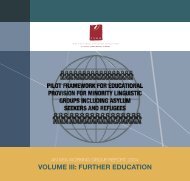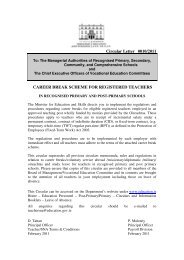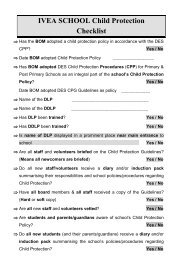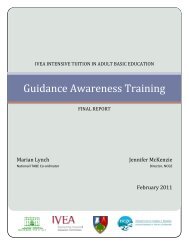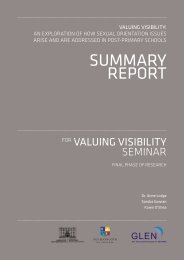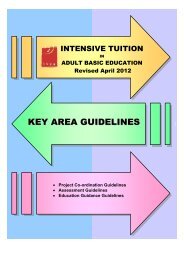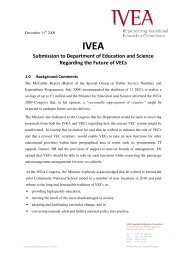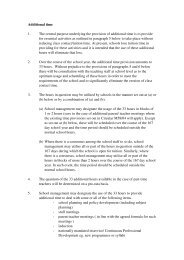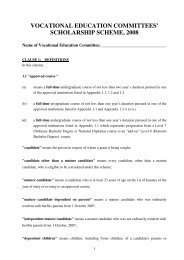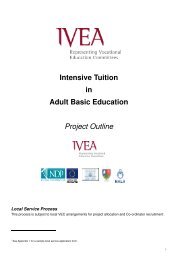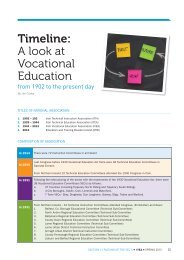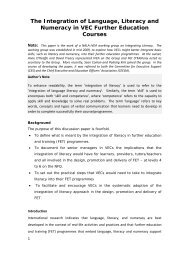Download File - IVEA
Download File - IVEA
Download File - IVEA
Create successful ePaper yourself
Turn your PDF publications into a flip-book with our unique Google optimized e-Paper software.
INTRODUCTION<br />
<strong>IVEA</strong> AND THE SPECIALIST<br />
WORKING GROUP<br />
The Irish Vocational Education Association (<strong>IVEA</strong>) is the national<br />
representative body of Ireland’s thirty-three Vocational Education<br />
Committees (VECs). Part of <strong>IVEA</strong>’s role is to develop policy guidelines<br />
in a range of areas in the vocational education sector. This is done in<br />
consultation with its member VECs.<br />
In recent years there has been a significant increase in the number of<br />
minority linguistic groups arriving in Ireland. This culturally enriching<br />
development poses a number of challenges to Irish political culture<br />
and governance, particularly to the education sector. Fortunately,<br />
Ireland is in a position to learn from the experiences of neighbouring<br />
European states which have met these obligations with varying<br />
degrees of success in earlier decades.<br />
The <strong>IVEA</strong> has researched the challenges posed to the Irish education<br />
system on a national and international basis. VECs are dedicated to<br />
ensuring access by a commitment to equality, diversity of choice and<br />
empowerment of the individual. Historically, the VECs have tackled<br />
poverty and social exclusion through specialised services/initiatives<br />
targeting marginalised communities. Meeting the needs of asylum<br />
seekers, refugees and other minority linguistic groups presents a<br />
considerable challenge to the vocational education sector. However,<br />
the working group’s findings suggest it is imperative that the second<br />
level sector effectively addresses educational provision for new<br />
minority linguistic communities to prevent economic deprivation and<br />
social fragmentation.<br />
Following an emergency resolution of <strong>IVEA</strong> Congress in 2000 <strong>IVEA</strong><br />
established a specialist working group charged with examining the<br />
potential opportunities and resources needed to cater successfully for<br />
the educational needs of asylum seekers and refugees. The working<br />
group later extended its brief to include minority linguistic groups with<br />
English language needs.<br />
Membership of the specialist working group is comprised of<br />
educationalists and researchers with a keen interest in or expert<br />
knowledge of educational provision for asylum seekers, refugees and<br />
other minority linguistic groups. Members are drawn from a wide<br />
geographical catchment area, reflecting the dispersal and settlement<br />
of the refugee/asylum seeker population throughout Ireland.<br />
Members of the <strong>IVEA</strong> specialist working group:<br />
• Luke Murtagh, Co. Tipperary North Riding VEC –<br />
Chairperson and CEO;<br />
• Sarah Kavanagh, <strong>IVEA</strong> Secretariat –<br />
Working Group Co-ordinator;<br />
• Moya Corry, Co. Kildare VEC –<br />
Principal and Educationalist;<br />
• Eithne Cunneen, City of Limerick VEC –<br />
Adult Literacy Organiser;<br />
• Cróna Gallagher, Co. Donegal VEC –<br />
Adult Education Organiser;<br />
• Rachel Hegarty, City of Dublin VEC –<br />
Language Tutor and Lecturer;<br />
• Marie Humphries, Whitehall College of Further Education –<br />
TUI Representative and Educationalist;<br />
• Frank Nash, City of Cork VEC -<br />
Public Representative and Educationalist;<br />
• Olga Ncube, Nominee of the Irish Refugee Council –<br />
Educationalist;<br />
• Karl Quinn, Co. Clare VEC –<br />
Co-ordinator and Language Tutor;<br />
• Tanya Ward 15 , City of Dublin VEC –<br />
Research and Development Officer.<br />
The research conducted by the working group during 2000/2001<br />
resulted in a report with detailed findings and recommendations.<br />
The <strong>IVEA</strong> Policy on Educational Provision for Asylum Seekers,<br />
Refugees and other Non-nationals was presented to <strong>IVEA</strong><br />
Congress in 2001 and unanimously adopted. The policy outlines<br />
broad parameters for the delivery of educational services to bilingual/<br />
EAL learners by the VECs.<br />
During 2001/2002 the working group focused on preparing a<br />
framework for implementation of <strong>IVEA</strong> policy. The group chose<br />
to focus initially on producing a pilot framework for the adult and<br />
community education (Lifelong Learning) sector as no guidelines or<br />
structures had been established to cater for the educational needs<br />
of bilingual/EAL learners within that sector. In October 2002 the<br />
<strong>IVEA</strong> published a report entitled Pilot Framework for Educational<br />
Provision for Asylum Seekers, Refugees and Minority Linguistic<br />
Groups. Volume I: Lifelong Learning.<br />
This 2002 publication contains a recommended framework for<br />
the delivery of services within the adult and community education<br />
sector. Upon publication the Pilot Framework was circulated to all<br />
Vocational Education Committees. After a period of three months,<br />
the VECs were invited to send delegates to a series of consultative<br />
10<br />
15<br />
Since November 2003, Ms.Ward is working at the Irish Council for Civil Liberties.



